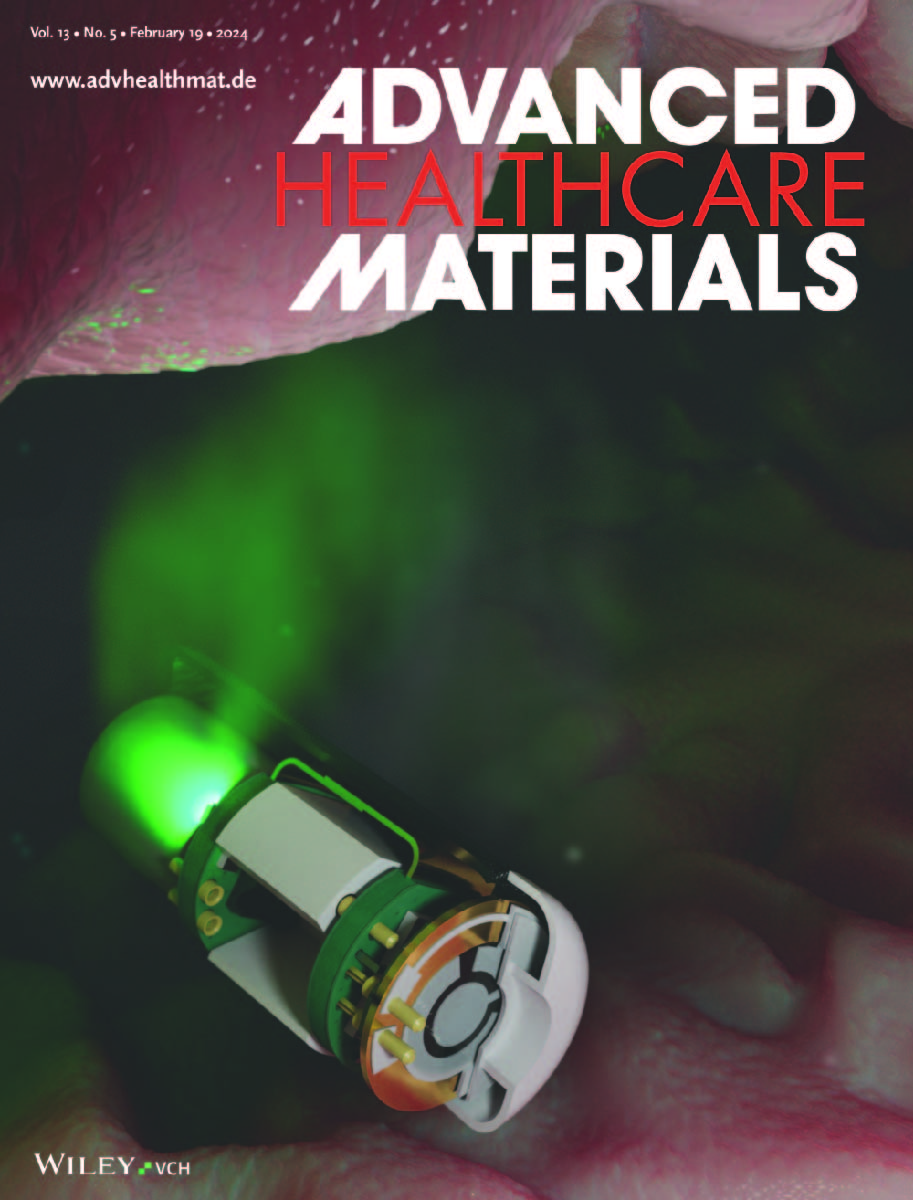 |

|
 |
Cover of Advanced Healthcare Materials Vol. 13, No. 5. Click to enlarge |
|
FOR IMMEDIATE RELEASE February 19, 2024
CONTACT:
Lauren Bacon
University of Maryland Clark School MATRIX Lab
Lbacon1@umd.edu
COLLEGE PARK, Md. – University of Maryland research is published in Advanced Healthcare Materials, and their cover design was highlighted as the front cover picture of the journal. Researchers working in Professor Reza Ghodssi’s (ECE/ISR/Fischell Institute Fellow) MEMS Sensors and Actuators Laboratory (MSAL) have been advancing a non-invasive, ingestible capsule that uses wireless technology to provide information to diagnosticians in real time. It provides an alternative to invasive techniques like endoscopies when monitoring gut health. The capsule is in development and not currently available to the medical community.
The work is in the latest issue of the journal, Volume 13, Issue 5, published February 19, 2024. “Miniaturized Capsule System Towards Real-time Electrochemical Detection of H2S in the Gastrointestinal Tract” was written by alumnus and current MATRIX Lab Assistant Research Scientist Justin Stine (Ph.D. '23, Electrical & Computer Engineering), alumnus Hossein Abianeh '22, Electrical & Computer Engineering Ph.D. student Katie Ruland and Materials Science & Engineering Ph.D. student Joshua Levy, UMD Research Associate Luke Beardslee, UMD Visiting Assistant Professor Santiago Botasini, Mayo Clinic gastroenterologist Pankaj J. Pasricha, and Ghodssi.
“The paradigm of ingestible capsules has long fulfilled a diagnostic role for minimally invasive screening, taking images, and measuring our body’s physiology,” Dr. Ghodssi said. “Emerging capsules are challenged to sense complex biomarkers that demand advanced functionality. This makes systems integration and data learning techniques essential to capsule design.”
The A. James Clark School of Engineering at the University of Maryland serves as the catalyst for high-quality research, innovation, and learning, delivering on a promise that all graduates will leave ready to impact the Grand Challenges (energy, environment, security, and human health) of the 21st century. The Clark School is dedicated to leading and transforming the engineering discipline and profession, to accelerating entrepreneurship, and to transforming research and learning activities into new innovations that benefit millions. Visit us online at eng.umd.edu and follow us on Twitter @ClarkSchool.
Related Articles:
University of Maryland Research is Redefining Health Care
Research Paper and Cover Art Now Feature Article in Journal
Ingestible Capsule Advances May Lead to Earlier Detection of Diseases
New features on ingestible capsule will deliver targeted drugs to better treat IBD, Crohn’s disease
Gut Health Monitoring Gas Sensors Added to Ingestible Capsule Technology
Dropping an anchor for better GI tract disease treatment
New ‘FRRB’ packaging technology may solve an ingestible capsule challenge
Fischell Fellowship advances visiting assistant professor’s work
Adjustable Drug Release Marks New Milestone in Ingestible Capsule Research
Ghodssi invited speaker at NIMH workshop on sensor technologies to capture the complexity of behavior
February 19, 2024
|

